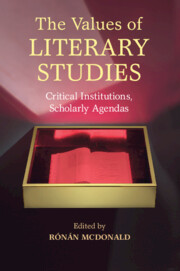Book contents
- Frontmatter
- Contents
- Notes on Contributors
- Acknowledgments
- Introduction
- 1 The Value of Criticism and the Project of Modernism
- 2 Caprice: Individual Subjectivity in Literary Criticism
- 3 The Phenomenology of Literary Valuation
- 4 Literature Is History: Aesthetic Time and the Ethics of Literary Will
- 5 Dead on Arrival: Time and the Value of Old Books
- 6 The Price of Value
- 7 To Shelter the Nothing That Happens
- 8 When Literary Criticism Mattered
- 9 Literature among the Objects of Modernist Criticism: Value, Medium, Genre
- 10 “Vale!” : Psychoanalysis, Value, and Literature
- 11 Afterlives of Comparison: Literature, Equivalence, Value
- 12 Feminism, Gender, and the Literary Commons
- 13 The Value of World Making in Global Literary Studies
- 14 Multiple Versions and Fictional Minds: Manuscript Research, Digital Editing, and Enactive Cognition in Literary Studies
- 15 After Suspicion: Surface, Method, Value
- 16 Literary Experience and the Value of Criticism
- Index
5 - Dead on Arrival: Time and the Value of Old Books
Published online by Cambridge University Press: 05 November 2015
- Frontmatter
- Contents
- Notes on Contributors
- Acknowledgments
- Introduction
- 1 The Value of Criticism and the Project of Modernism
- 2 Caprice: Individual Subjectivity in Literary Criticism
- 3 The Phenomenology of Literary Valuation
- 4 Literature Is History: Aesthetic Time and the Ethics of Literary Will
- 5 Dead on Arrival: Time and the Value of Old Books
- 6 The Price of Value
- 7 To Shelter the Nothing That Happens
- 8 When Literary Criticism Mattered
- 9 Literature among the Objects of Modernist Criticism: Value, Medium, Genre
- 10 “Vale!” : Psychoanalysis, Value, and Literature
- 11 Afterlives of Comparison: Literature, Equivalence, Value
- 12 Feminism, Gender, and the Literary Commons
- 13 The Value of World Making in Global Literary Studies
- 14 Multiple Versions and Fictional Minds: Manuscript Research, Digital Editing, and Enactive Cognition in Literary Studies
- 15 After Suspicion: Surface, Method, Value
- 16 Literary Experience and the Value of Criticism
- Index
Summary
“The value of literature” is in itself a tautological proposition. Declaring that a particular piece of writing is “literature” makes a statement about its value. It distinguishes individual pieces of writing from the vast mass of written material by making claims about the formal characteristics and affective power that allow them to be included in “literature,” and it implies that those texts have a value that is not contingent on the tastes or judgement of readers from a particular place or time.
The creation of literature as a locus of value thus depends critically on the work of its advocates. In particular, professional literary critics sustain the continuity of literature from the past through the work of editing, interpretation, and analysis. Texts, whose language and social assumptions present barriers to immediate readerly engagement, can, with the help of this work, be valued as “literature,” and that value is perpetuated in the educational curricula of literary institutions.
The powerful apologias for literary value that appear in Shakespeare's sonnets offer an interesting example of the process of creating literary value. Those poems use familiar early modern tropes to contrast the decay of the sublunary and postedenic physical world with the enduring power of his verse and the eternal memory of his beloved:
Nor marble nor the gilded monuments
Of princes shall outlive this powerful rhyme
But you shall shine more bright in these contents
Than unswept stone besmeared with sluttish time
When wasteful war shall statues overturn,
And broils root out the work of masonry
Nor Mars his sword not war's quick fire shall burn
The living record of your memory.
'Gainst death and all oblivious enmity
Shall you pace forth; your praise shall still find room
Even in the eyes of all posterity
That wears this world out to the ending doom.
So till the judgement that yourself arise,
You live in this, and dwell in lovers’ eyes.
(Sonnet 55)The effect of this and other sonnets is to hold still the passage of time in the tight formal structure of the sonnet while making a statement about the deep connections between past and present. The intellectual work of understanding and reflecting on those connections is reiterated in the historical processes of literary studies and provides eloquent support for the claims made for the poems’ value across time.
- Type
- Chapter
- Information
- The Values of Literary StudiesCritical Institutions, Scholarly Agendas, pp. 75 - 90Publisher: Cambridge University PressPrint publication year: 2015

